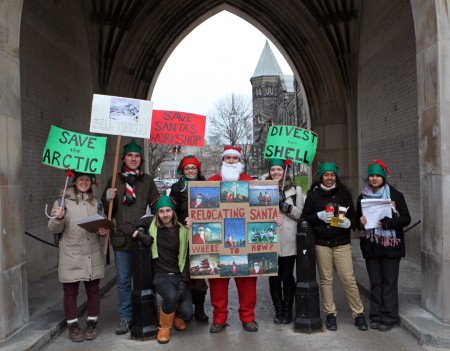Today, we collected more than 200 petition signatures calling on the University of Toronto to sell their stock in Shell:
I am thoroughly appreciative to the Toronto 350.org volunteers who organized the whole event and then pulled it off today.
We will be building up our divestment campaign by seeking more signatures, including from campus groups and prominent alumni.
Both those associated with the University of Toronto and outside sympathizers are asked and encouraged to sign our petition. We are hoping to get thousands of names on it before we present it to the president of the university.




Climate change and arctic drilling are not the only important reasons for divesting from Shell. They also have a pretty dodgy human rights record.
For instance:
Massey College even has some objects related to this murdered anti-Shell activist, including a chair inscribed with a poem he wrote and his final letter to his son.
Well done.
Divestment seemed a very important and effective way of protesting aprtheid in South Africa.
More photos from yesterday
Looks like a very successful and effective activity. Thank you for doing your part and caring so deeply.
More photos of places where Santa might relocate, now that climate change is destroying his arctic home:
The backdrops of all of these are Creative Commons-licensed photos picked out by Toronto 350.org’s Creative Director, Neal Lantela. He also took the photos of Stuart Basden in the Santa suit and edited the two sets of images together.
Comparatively few people have been signing the online petition. Any ideas for effective ways in which it could be promoted?
The case centres on the purchase of a big offshore oil field known as OPL 245, and touches the top ranks of both firms. In the dock will be, among others, Eni’s current CEO, Claudio Descalzi, and Shell’s former exploration chief, Malcolm Brinded. Also on trial are the firms themselves, charged with failing to prevent bribery. The individuals face jail if convicted; the companies face fines. All deny wrongdoing.
…
International investors are particularly vexed about the alleged involvement of Shell, a blue-chip oil major. Last year, after e-mails were leaked, it admitted that executives had known that much of the purchase price would go to Mr Etete, a convicted money-launderer. In the e-mails, they speculated that funds might flow on to Mr Etete’s political friends. One investor says that Shell, by emphasising for so long who the contract was with, not where the money was going, honoured the letter but not the spirit of good governance—“and that’s not good enough anymore”.
Dutch investigators, too, are on Shell’s back. They raided its offices in The Hague in 2016 and tapped the phone of Ben van Beurden, Shell’s current chief executive. Mr van Beurden was not in the job when the oil block was bought and faces no charges. A sizeable team of Dutch investigators is still working on the case, though the Italians have been given the lead.
International oil companies wrestle with the clash between their duty to deliver value to shareholders and the fact that how they produce those returns threatens the planet. A key question is whether they can reduce greenhouse-gas emissions without gutting their businesses. On December 3rd Royal Dutch Shell went further than any other oil major so far in insisting it could. The firm announced that it would set specific targets for reducing carbon emissions every three to five years, with the goal of shrinking its net carbon footprint by about half by 2050.
Shell will also ask shareholders to reward executives for managing a transition to cleaner energy, though the details are still to be worked out. Remarkably, its targets will cover not only emissions from its own production of oil and gas, but from all cars, lorries, planes and factories that eventually burn the stuff. Shell will use sales of its products to estimate their subsequent emissions. Other changes include reviewing ties with lobbying groups bent on undermining action on climate change (the oil-and-gas industry spent $126m lobbying in America last year; only four other industries spent more). These steps are unprecedented—and a reminder of how far the rest of the industry has to go.
Dutch court will hear widows’ case against Shell over deaths of Ogoni Nine
Judges order oil firm to release confidential documents as wives of late Nigerian activists get go-ahead to pursue claim
Shell faces UK supreme court case over Niger delta pollution | Business | The Guardian
https://www.theguardian.com/business/2020/jun/23/shell-faces-uk-supreme-court-case-over-niger-delta-pollution
Prosecutors seek jail terms over Shell and Eni oil deal in Nigeria
Italian authorities accuse firms of paying bribes to secure part of oilfield in deal worth $1.3bn